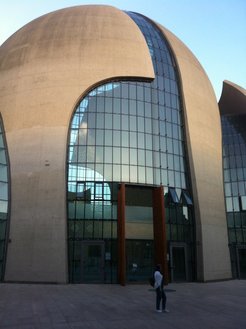Language change and persistence within Turkish mosques in Germany
by Arndt Emmerich
Blog | January 2022
On a Saturday evening of October 2018, at 9.30pm, I was sitting with 20 young men between 16 and 25- years-old in a circle over tea and biscuits in the youth room of a mosque in urban Lower Saxony, Germany. The speaker, Bilal, started with a poem which he had translated from Turkish to German. What followed was a demanding presentation of the Turkish understanding of Sufism, with citations from Goethe’s second Divan, regarding the heroic attributes of the Prophet. Bilal’s challenge was how to communicate the feeling of an ordinary Muslim and his understanding of Islam, in German. He described it this way: ‘It is often a task of several hours to translate one word. The German language is not yet a medium [Träger] for Islamic knowledge, and [therefore] has to accept Arabic and Turkish words and concepts’. During the more informal part of the evening, attendees discussed how beneficial it was to have such a presentation in German, because it helps to communicate effectively with non- Muslims. The German component was only recently allowed by the mosque elders. One week earlier, I had spoken to Osman, a man in his thirties, and committee member of the same mosque. He explained the mosque’s language policy, which operates 80% in Turkish and 20% in German. For instance, the weekly sermon (hutbe) is in Turkish, but a beamer projects the content on the wall in German. In his view, the sermon should remain in Turkish and so should the official language of the mosque ‘even in 40 years’, to protect the Turkish heritage. His sentiment was echoed by a 23-year-old member of a female mosque group. She wanted her children to speak Turkish, which she said was only possible if she maintained the language herself. She observed sadly that her brothers’ Turkish had already become much weaker.

German policymakers often see language change as a primary indicator of “successful integration”. My research interrogates, through ethnographic engagements like those shown above, how local communities and individuals negotiate, implement and at times contest such demands. By visiting more than 20 mainly Turkish mosques, I asked how language change can be facilitated in a mindful way, in which German becomes an accepted medium for teaching Islamic knowledge, while heritage languages such as Turkish can still be transmitted to the next generation. Religious and ethnic minorities in Germany are often left alone, fending for themselves to maintain and transmit their heritage language to the next generation. Muslim parents, to whom I spoke, were concerned that their children are losing their heritage language and thereby the ability to speak with relatives and grandparents. Other German-born Muslim teenagers admitted that it can be challenging to maintain Turkish with all what is going on in their busy lives, but also that language can become politicised and tied to transnational discourses and domestic experiences of discrimination.
Preserving the heritage language in mosques is also in direct confrontation with Germany’s integration discourse, which aims to reduce linguistic differences. However, cultural anthropologist, Thijl Sunier, already said that a complete language immersion seems unattainable, due to Germany’s conception of “ethnic and lingual homogeneity (…) If your ethnic background is Turkish, you will be considered a foreigner, even if you only speak German.” Hence, the recent political demands of a German (-speaking) Islam have to be questioned on several levels. First, language change does not remove ethnic identification, and neither does it increase universal integration, because of Germany’s homogeneous understanding of national belonging. Second, German adaptation does not necessarily change the public perception of mosques, neither does it reduce anti-Muslim racism, in particular regarding conservative groups. Those might be even worse off, as they attract enhanced public scrutiny. Third, externally imposed language change creates schisms, intergenerational tension, family conflicts, and brain-drain from local mosques. Finally, a premature adaptation of the host country language contributes to the disappearance of certain Islamic traditions, given the absence of an adequate Islamic higher education infrastructure in Germany – unlike for instance in the British context in which the first full-time Islamic boarding school for future Imams opened in 1973.
Mosque communities in Germany are at the forefront of the variegated societal demands and demographic changes, thus trying to balance between an ambivalent integration debate and an assertive Turkish diaspora policy. Overall, they are not on a unidirectional pathway towards language assimilation, as often predicted, but are involved in complex negotiations between host country and heritage languages. Some of them have already developed novel pedological tools and hybrid approaches to ensure that future generations are better equipped to navigate in a society that is not always open to bilingualism. Hence, politicians and policymakers would be well- advised to take linguistic diversity more seriously, guaranteeing sustained communication with and appreciation for German Muslims and linguistic minorities in general, rather than insisting on monolingual assimilation.
References:
Emmerich, A. 2021. Language change and persistence within Turkish mosques in Germany – Transnational ties and domestic demands, Journal of Ethnic and Migration Studies
Sunier, T. 2004. “National Language and Mother Tongue.” In Civil Enculturation, Nation-State, School and Ethnic Difference in The Netherlands, Britain, Germany, and France, edited by W. Schiffauer, G. Baumann, R. Kastoryano, S. Vertovec, 210–241. New York: Berghan.












